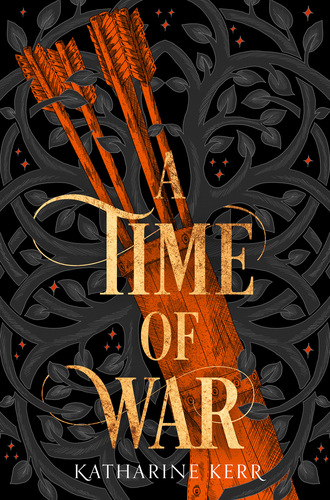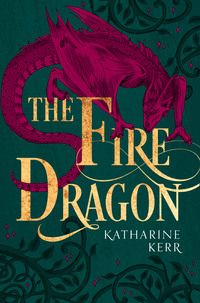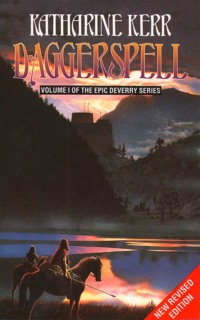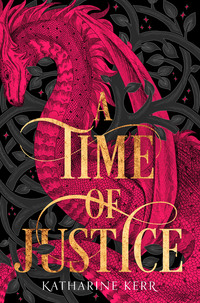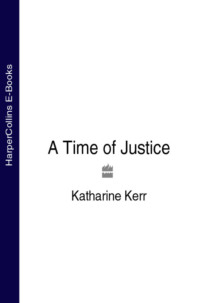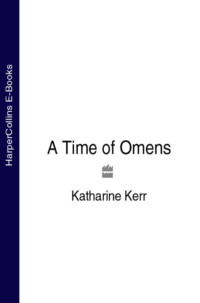‘Let him go, Mam.’ Her voice was a hollow whisper. ‘He’ll be safer there than here.’
Involuntarily Jahdo glanced at Verrarc, standing just behind her, and saw the strangest smile on the councilman’s face. It reminded him of a playmate caught cheating in a game. Dera considered for a long moment, taking her daughter’s strange pronouncement seriously, as indeed she always did whenever Niffa came out with one. For a moment she seemed about to speak; then she burst into tears and rushed off, dodging her way through the remnant of crowd. Swearing under his breath, Kiel followed her.
‘Well, then, that’s settled.’ Rubbing his hands together, Verrarc stepped forward. ‘Lael, since your son’s fulfilling an obligation for the entire town, the council will of course provide him with a pony and such supplies as he’ll be needing for this journey. Meer, the Chief Speaker and I did think that we could spare you some armed guards, as well, a squad of militia, say, and some pack horses.’
‘You can’t spare them, councilman,’ Meer said. ‘That’s the point of my journey here, wasn’t it now? Besides, the child and I will be safer on our own. I know a trick or two about smelling my way to safety when I have to. If need be, the lad and I can always hide in wild places, but hiding a whole pack of armed men in the forest is beyond me.’
‘Hiding?’ Lael stepped forward. ‘From what? Now wait just a moment, good bard. I had no idea –’
‘Da!’ Niffa snapped. ‘It’s needful that you let him go.’
‘Come now, my good sir,’ Meer said. ‘The lore teaches that one of the fifty-two fixed things is this: when women lay down the law, men must do as we’re told.’
Lael turned to him, utterly baffled by this statement, a gesture, of course, lost on the bard.
‘He does agree,’ Niffa broke in. ‘Jahdo, come home now. We’ve got to get your gear ready.’
Lael started to protest, then merely threw his hands in the air to reproach the gods and followed the two children as they hurried across the by-then empty plaza. When Jahdo looked back, he saw Demet running after as well. Standing where they’d left them, Verrarc and the Gel da’Thae conferred, heads together, while the rest of the Town Council hovered anxiously nearby.
The family spent a miserable evening round the central hearth, where two candle lanterns stood, sending long shadows flickering on the walls. No one wanted a fire on such a muggy night. For a long time Dera and Lael paced back and forth, squabbling and cursing each other and the Town Council both while the family merely listened. Niffa and Demet sat on a wooden bench; Kiel leaned in the doorway and glowered; Jahdo scrunched into a corner with a ferret cradled in the crook of his arm for comfort. All at once he realized that his father was speaking to him.
‘Why? Why did you say you wanted to go?’
Jahdo opened his mouth to answer only to find that he had no words. Although he tried his best to remember what had made him speak, the entire episode by the council fire had blurred in his mind into something much like a half-remembered dream.
‘The adventure of the thing, maybe?’ Lael said, softening his voice. ‘Lad, lad, you can tell me.’ He crouched down to Jahdo’s level. ‘What be wrong? Second thoughts?’
Jahdo nodded. Lael let out his breath in a puff.
‘Too late now, lad, to get out of it. You should have thought of this then. Ye gods, it’s not like we can spare you here. There be a passle of work, this time of year.’
‘Lael?’ Demet broke in. ‘If my sergeant does release me, I’ll come take Jahdo’s place.’
Niffa gave him a brilliant smile that made him blush. Lael pretended not to notice.
‘Now that be decent of you, lad,’ he said. ‘I’ll speak to him myself. It’s been many a long year since I served my turn in the militia, and I wouldn’t mind having someone good with a sword round the place.’
‘Why, Da?’ Jahdo found his tongue at last.
‘Don’t know.’ Lael hesitated, suddenly uneasy. ‘It’s just that somewhat be wrong. I can feel it, like.’
‘Everything be wrong.’ Dera began to weep. ‘Jahdo, Jahdo! Naught will ever be right again.’
Jahdo clutched Ambo so tight that the ferret whipped his head round and nipped his wrist, then slithered free and dashed for the other room. Jahdo stood up.
‘Mam, don’t be crying! Please! It’s needful that I do this.’ He felt as if he were struggling to open a locked door, shoving and pushing and banging against some huge expanse of solid oak, but he simply could not voice the truth, that he’d never wanted to agree.
‘You could at least tell your mother why,’ Lael snapped.
The entire family was staring at him, waiting for him to speak.
‘I can’t. I don’t know why. I can’t say it.’
Lael sighed and threw his hands into the air.
‘To think that a son of mine!’ he snapped. ‘Ye gods!’
‘Da!’ Niffa came to Jahdo’s rescue. ‘Leave it be. There’s no help for it now, anyway, no matter what the reason.’
Dera wiped her eyes on a bit of rag and nodded agreement.
‘And I’ll say one thing for that Gel da’Thae bard,’ she snarled. ‘He’s got some respect for a mother’s heart, not like our Verro. Here I’ve known him since he was a tiny lad, a pitiful little thing with that rotten father of his, and me the only woman in this town who’d stand up to old Renno, at that, and tell him to keep his belt off his lad’s back. To think he’d treat one of mine this way now that he’s made his way in the world!’
Jahdo tried to speak so hard that he began to tremble, but words would not come. Dimly he remembered that Verrarc had somehow or other spared his life, but he could not tell his mother, could not find one word.
‘Now here, the lad be exhausted,’ Demet said. ‘Lael, a dropped plate’s past mending, isn’t it? Might as well let Jahdo get his sleep. He’ll need it.’
Jahdo decided that as prospective brothers-in-law went, Demet had a lot to recommend him. Before his parents could start in on him again, he retreated to the bedchamber.
Although Jahdo was sure that he’d never fall asleep, suddenly it was dawn. Wrapped in their blankets, Kiel and Niffa were sleeping nearby; the ferrets lay tumbled in pairs and threes in their straw. Jahdo got up, considered waking everyone, then decided that he could never bear to say goodbye. The night before, he’d gathered into a sack his few pieces of extra clothing, along with his winter cloak and the bone-handled knife his grandfather had given him, and put the lot by the front door. He dressed, pulled on his heaviest pair of boots, and slipped out of the chamber, tiptoeing past his parents’ bed. At the door he stopped, looking out into the grey light brightening on the passageway outside. If he turned round for a last look at home, he would cry. He grabbed his sack and hurried out.
He slithered down the passageway, climbed down the ladder, bolted into the wider street, and nearly collided with Councilman Verrarc. In the rising light Verrarc looked ill – that was the only word Jahdo had for it, anyway. His skin was dead-pale, and his eyes seemed huge, sunk in the puffy shadow of dark circles. Behind him stood two guards, armed, wearing chain mail shirts under the loose red tabards that marked them as servants of the Council of Five. Even though his family knew their families, Jahdo saw them as jailors.
‘There he is,’ Verrarc sang out, and he was making some attempt at a smile. ‘Jahdo, the council does send its official thanks. Do you realize what that means? By taking up this burden of the treaty bond, you do work for everybody – the town, the council, your family – everybody. Why, lad, you be a hero!’
The two guards nodded their solemn agreement. Jahdo merely shrugged. He knew that if he tried to say one word, tears would pour and shame him. And yet, when they reached the main jetty and discovered the entire council assembled to hail the rat boy, Jahdo found himself caught by the moment. Admi himself stepped forward to take his hand and lead him onto the barge, where the town banners snapped and rustled as the mists blew away. The councilmen bowed, the oarsmen saluted, the militia all watched him with awe. Jahdo’s heart began to pound from the honour of it. Maybe he was a hero, after all. Maybe he really did believe them. Maybe he really did want to go.
At the main gates out Meer stood waiting beside his huge white horse. With his staff in one hand he turned his sightless eyes their way and boomed out a greeting as the procession made its way up. The honours evaporated like summer mist from the lake.
‘Well, Jahdo lad, are you ready for our journey?’
‘Not truly.’ The words leapt from his mouth. ‘Meer, I be scared.’
The councilmen winced and looked this way and that, but the Gel da’Thae laughed.
‘Good. So am I. We’ve every right to be. Neither of us are warriors, are we?’
‘So we’re not,’ Jahdo said. ‘I wish we were.’
Meer laughed again and swung his head round.
‘Councilman Verrarc? Where are you?’
‘Here, good sir.’ Verrarc stepped forward. ‘My men tell me you don’t want the lad to have a pony.’
‘Just so. The pack mule and supplies will do us, and very generous you townsmen are, I must say. Jahdo and I will walk, because warriors we are not, only a blind man and a lad, and much more fitting it will be for us to stay on our two feet. And safer, as well. All during my long journey from the trading stations of the east, I’ve been studying to be humble, and Jahdo my friend, I recommend the same to you. When a man runs the risk of meeting his ancestral enemies, humility becomes him.’
No one seemed to be able to think of fine words to answer those.
‘Let us address the gods,’ Meer went on, ‘and beg them for a safe journey as we go about our business. All our doings lie in the hands of the gods, after all.’ He flung himself to his knees, bowed his head, and stretched out his arms like a suppliant. ‘O you gods who dwell beyond the sky, all-powerful and all-seeing, and especially the gods of roads, O you, Tanbala of the North, O you, Rinbala of the South, Thunderers and Shakers, hear our prayer!’
Meer prayed for a long while, both in his language and that of the Rhiddaer, while the men looked this way and that and Jahdo watched fascinated. The folk of the Rhiddaer prayed, when they prayed at all, standing on their feet and facing the home of whatever god they were invoking, whether it was a tree or a hot spring or a fire mountain. He’d never seen anyone grovel in front of the gods before, and the sight embarrassed him. At last, however, Meer finished and rose, dusting off the knees of his leather trousers as if he’d done something perfectly ordinary. The men standing round all sighed in relief.
Verrarc handed Jahdo the lead rope of a fine brown mule, laden with canvas panniers.
‘Farewell, lad, and may we meet again soon.’
Jahdo had never heard anything less sincere in his life.
As the gates swung open, he took the lead, urging the mule along with little clucking noises such as he’d make to encourage a ferret. One of the guards handed him a switch.
‘Beat the mule as much as it needs,’ he remarked. ‘Stubborn ugly things.’
‘Here!’ Meer bellowed. ‘What did he give you? A stick or suchlike? Throw it away, lad. I’ll teach you how to handle a mule, and beatings have no part in it.’
Secure in Meer’s blindness the guard grinned and rolled his eyes, but Jahdo tossed the switch away.
All that morning they followed a hard-packed dirt road east through reasonably familiar country. Although Jahdo had never been more than a mile or two away from Cerr Cawnen, the farmers round about were still his people. Their wooden longhouses, all painted white and roofed with split planks, stood in the midst of fields of volcanic earth so rich some thought it magical. Often, as they walked past a fenced field or a pasture, a well-dressed man or a couple of plump children would leave their ploughing or cattle to run to the side of the road and stare at them. For the first few miles, Meer strode along in silence, swinging his stick back and forth on the road with one massive hand as he led his horse with the other. Wrapped in his instant homesickness, Jahdo was glad to be left alone at first, but the farther they went, the harder it became to keep back his tears.
Since he’d never eaten that morning, as the sun rose high in the sky his stomach began to growl. He could imagine his family coming back home for their noon meal, gathering at the long table and watching while Mam dipped soup from the kettle and cut bread into chunks. He caught his breath with a sob.
‘What’s this?’ Meer bellowed. ‘What do I hear?’
‘Naught, good bard.’
‘Hah! You can’t fool my ears, lad. Don’t even try. Huh. The sun feels hot on my back. Is it near midday?’
‘It is, truly.’
‘Time for us to stop and see what kind of provisions your councilmen gave us, then. Look round. Do you see a stream nearby? We should be watering our animals, anyway.’
About a quarter-mile down the road Jahdo found them a shallow stream with a grassy bank. Working under Meer’s direction, he unbuckled the pack saddles, but Meer himself had to heft them down. Despite his affliction the Gel da’Thae moved remarkably surely when it came to tending his horses. Watching him rub down the white horse, Baki, with a twist of grass, with the bard talking under his breath all the while, or seeing him patting the horse and leading him to the stream, it was hard, in fact, to remember that Meer was blind. The mule received the same attention.
‘We’ll name you Gidro,’ Meer announced. ‘That means strong in my people’s talk, and a fine strong mule you are.’
Gidro leaned its forehead against the bard’s chest and snorted.
‘Mules are one of the thirteen clever beasts, young Jahdo. Your people abuse them and call them stubborn, but by every demon among us, who can blame the mule? Here, he thinks to himself, why should I be sweating and straining my back all for the benefit of some bald two-legged thing that smells of meat and piss? All I get out of it is sour hay and a draughty shed. A pox on them all, thinks the mule.’
Jahdo found himself laughing.
‘That’s better, lad,’ Meer said. ‘I know it’s a hard thing I’ve asked you to do. Now go through those packs, there, and find us a bite to eat.’
Much to his delight, Jahdo found a lot of food wrapped and cached in various cloth bags, including some chewy honey cakes. Meer had him bring out some dark bread and cheese, which Jahdo sliced up with his grandfather’s knife. Before they ate, however, Meer recited yet another prayer, though mercifully it was a good bit shorter than his effort back at Cerr Cawnen, to thank the god Elmandrel for the food.
‘The gods do matter a fair bit to you, don’t they, Meer?’ Jahdo said.
‘They do, and so they should to all the Gel da’Thae, for we are sinners in their sight, more loathsome than worms.’ Meer held out his hand for lunch. ‘Thanks, lad. That cheese smells good, I must say. At any rate, we all sinned mightily against the three hundred sixty-five gods and the thousands upon thousands of the Children of the Gods, back in the old days, when the Red Reivers fell upon us. Your people, now, they suffered much at the hands of the Lijik Ganda, but as victims they did not sin.’
‘Er well, that be splendid, then.’
Meer merely grunted and bit into his bread and cheese. Jahdo followed suit, and for a long time neither of them spoke. Jahdo had heard stories of the old days from priests and singers among his own people, who recited them at public feast-days, such as the celebrations of spring and the harvest time, but he had never considered that those ancient events would someday reach out dead hands to touch his own life. The Slavers lived only in stories, didn’t they, to frighten children into behaving? Stop pinching your sister right now, or the Slavers will come get you – that sort of thing. But he’d just found out that they were real, and he was heading their way.
Far far to the east, or so the stories ran, lay a beautiful kingdom that once had belonged to the ancestors of the Rhiddaer folk, where they lived in peace and prosperity near the trees and springs of the ancient gods. One dark day a new people appeared, warriors who thundered down on horseback and killed or enslaved the peaceful farmers. On their stolen land and with their slave labour, these invaders built stone towers and towns made of round houses, where they lived at ease while the ancestors were forced to work the fields. A few at a time, though, the ancestors had slipped away, seeking freedom. Some died in the attempt; others escaped to found a new country, the Rhiddaer, where kings and lords such as commanded the Slavers were forbidden forever by law. Finally, the Slavers’ blood-thirsty ways brought ruin upon their own heads, when a huge civil war, lasting five and a hundred years, tore their kingdom apart. Most of the ancestors escaped during those days of retribution and made their way to freedom in the Rhiddaer. For a long time everyone hoped that the Slavers were all dead, but unfortunately, the warring madness had left them in the end, and their kingdom was prospering again.
‘Meer?’ Jahdo said. ‘The old stories do say that the Slavers used to cut off people’s heads and then tie them to their saddles and stuff. The heads, I mean, not the rest of the people. That be not true, bain’t?’
‘I fear me it is, lad. The lore passed down from bard to bard confirms it.’
Jahdo dropped his face into his hands and sobbed. After this whole long horrible day, the lore was just one thing too many to endure. He heard Meer sigh and move; then a broad hand fumbled for his shoulder and patted it.
‘Now, now, we’ve got to put our trust in the gods. They’ll guide us and protect us, and the Slavers will never even know we were walking their border.’
Jahdo snivelled back his tears and wiped his face on his sleeve.
‘Well, I be sorry I did cry.’
‘Don’t you think my heart aches within me, too? I tell you again, lad, warriors we are not, and thus the gods will hold us not to the warrior’s harsh honour.’
‘All right, then, but if ever I do get home again I’ll have to be a warrior when I grow up. I’ll have to join the militia, I mean. Everybody does. I guess it’s not like that in your country.’
‘It’s not, indeed. Only the chosen few become warriors, the best among us, and a grim lot they are, soaked in blood and death from the time they’re but colts.’
‘They be just like the Slavers were, then.’
Meer laughed, a rumble under his breath.
‘So they are, but I wouldn’t say that to them, if ever you meet some. And truly, you just might in the days ahead. You just might indeed.’
After they’d eaten, they loaded up the horse and mule again and headed east on the familiar road for the rest of that day. At times as they walked Meer would sing, or at least, Jahdo supposed that you could call it singing, a far different thing than the songs and simple tunes for dancing that his people knew. Meer’s voice rumbled deep and huge to match the rest of him, but it seemed he sang with his throat squeezed tight and forced the air out his nose, too – Jahdo wasn’t exactly sure – so that his notes hissed and wailed as much as they boomed, and the melody flowed up and down and round about in a long cadence of quarter-tones and sprung rhythms. Every now and then, Jahdo could have sworn he heard the bard sing chords, all by himself with no instrument to help him. At first the music threatened headaches, but by the third song Jahdo heard the patterns in it, and while he never grew to like it, he found it tolerable.
That night they made camp beside a duck pond in a farmer’s pasture, within sight of the wooden longhouse and big stone barn. After they’d eaten, Jahdo collected wood and tinder for a little fire, but he saved it for the actual dark. As the sunset faded to twilight, Jahdo found himself staring at the farm, watching the gleam from a lantern dancing in the windows, wondering how big a family lived there and if they were happy. When he wondered if he’d ever see his own family again, he started to cry, and this time Meer let him sob until he’d got it all out and felt better for it.
‘Well, lad, are you sorry you said you wanted to come?’
Jahdo tried to speak and found his throat frozen. All he could do was make a small choking sound.
‘Here, what’s that mean?’ Meer said.
‘Naught.’ Jahdo grabbed a handful of grass and blew his nose.
The Gel da’Thae swung his massive head round as if he were looking Jahdo’s way, but he said nothing. All round in the velvet evening insects buzzed and chirred. Jahdo tossed the ill-used grass away.
‘Meer? Why are you going east?’
‘That’s a fitting question, considering how I’ve dragged you away from hearth and home, but I’m not going to answer it.’
‘Here! Not fair!’
‘Fair has naught to do with it.’
Jahdo felt all his homesickness boil and turn to rage. He scrambled to his feet.
‘Then you may just find your way without me. I’m going home.’
He grabbed a bag of food from the ground and marched off, sighting on the last glow of the setting sun. Behind him Meer howled, a huge sound as if ten wolves sang.
‘Come back, come back!’
Jahdo heard stumblings and cursings, but he kept walking.
‘Stop!’ Meer’s anguish floated after him. ‘Wait! I’ll tell you, then.’
Jahdo stopped and turned round, but he hesitated. In the last of the light he could just see the bard’s silhouette, flailing round with his stick as he tried to follow over the rocks and hummocks. He moved remarkably well, considering, but he was angling away fast from the path that Jahdo had actually taken. He’ll die out here without me, Jahdo thought.
‘Meer, stop! I’m coming back.’
The bard sobbed once in relief and held still. Jahdo led him back to their camp, sat Meer down on a log, then busied himself with striking sparks from his flint and steel until the readied tinder at last caught. Jahdo blew the spark into a flame, fed in a little dried grass, then some twigs, and at last pieces of broken branch. As the light leapt and spread he moved back from the unwelcome heat. Meer was sitting with his head between his hands, his face turned as if he were staring into the fire. Seeing him look so defeated brought Jahdo a strange insight: never before had he argued with, much less bested, a grown man, and rather than exulting, he was frightened. Yet he refused to back down.
‘Well, tell me now. Why are you going east?’
‘It’s a long and bitter story, but you’re right enough that you should hear it. Pay attention, though, because I can only bear to repeat it this once.’ Meer cleared his throat several times before he went on. ‘I have an elder brother who became a powerful razkan, what you’d call a captain in your tongue, I suppose, the man who leads a group of warriors. And what with his raiding and then the legitimate battles between our various cities, he became famous, gathering many a free-born warrior round him, as well as the usual slave soldiers he bought with all his booty.’
‘Hold a moment. Slave soldiers? How can you give a slave weapons and make them fight?’
‘They’ve been bred and born among the Gel da’Thae, and they know that if they fight well, they’ll be set free.’
‘But still, I don’t understand. You think they’d just kill this razkan fellow and run away.’
‘Run to what? The wilderness? They know the civic authorities would hunt them down, and the gods wouldn’t help them the way they helped your people escape, because they’d be rebels and traitors.’
‘The gods helped us?’
‘Of course they did. They sent their own children to save and succour you, out on the grasslands to the south.’
‘I never did hear that before. I heard that it was some people who raised horses or suchlike. Why did the gods help us?’
‘Now here!’ Meer spoke with some asperity. ‘Do you want me to finish this tale or not? Fewer questions, if you please.’
‘I be sorry.’
‘Very well, then. Now, as I say, my brother, Thavrae his name is, his warrior’s name, I mean, though Svar was the name our mother gave him. Ah alas, woe betide the day she birthed him, and woe betide that his kin and clan have lived to see his infamy!’


